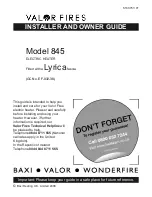
34
9. MAINTENANCE AND CARE
A
A
WARNING:
Check the heater for possible rodent
nests after long periods of non-use.
To be followed one month after start-up and then semi-
annually.
1. Inspect top of heater and drafthood for soot, a sticky
black substance around finned tubes and “V” baffles,
and open flue gas passageways. Any visible soot
should be cleaned for proper operation.
A
A
CAUTION:
Soot may be combustible. Wet sooted
surfaces completely prior to cleaning. Do not use steel
wire brush.
2.
The Low NOx burners and orifice areas should be
inspected annually. Dirt and debris can affect the
operation of the heater and could damage the burners
or prevent the heater from firing. DO NOT clean the
burners with a wire brush.
3. Inspect and operate all controls, gas valve and
pressure relief valve (if equipped).
4.
Make visual check of the burner and pilot flames.
Flame color is blue and evenly spread on the top
surface of the burner.
5.
On indoor heaters, clean room intake openings to
ensure adequate flow of combustion and ventilation
air.
A
A
CAUTION:
Combustion air must not be contaminated
by corrosive chemical fumes which can damage the
heater and void the warranty.
6.
Keep area around heater clear and free from
combustible materials, gasoline and other flammable
and corrosive vapors and liquids.
If Heater Will Not Fire:
If you have no electrical power, it may be that your “circuit
breaker” has tripped. Try re-setting it.
If you have electrical power but the heater will not fire
check the following or see
1. The time clock must be in the ON position.
2.
Your pump strainer basket may be full. If so remove
debris.
3. Your filter may be dirty. If so, backwash or clean
filter. (To tell if your filter is dirty, look to see if the filter
pressure is higher than usual).
4.
The pump may have lost its prime and be running
dry. Check the pressure on the filter. If there is no
pressure; then you are not moving water (or your
gauge is broken). Try to get the pump to run at its
normal flow rate.
Cold Weather Operation
Important Freeze Information
MODERATE CLIMATE:
Heater operation can continue
during short-term cold spells. When temperatures are
between 0°F (-18°C) and 32°F (0°C), flow (continuous
pump operation) must be maintained.
A
A
CAUTION:
Do not use the heater to maintain
water temperatures just above freezing or for freeze
protection. When heater is used during freezing weather,
care must be taken to avoid freeze-ups. Continuous
pump operation is a must. Additional protection may be
required. The heater is not warranted against freeze-ups.
COLD CLIMATE:
Prolonged operation with water
temperatures below 50°F (10°C) is not recommended.
When starting the heater with water temperatures below
50°F (10°C), operate the heater continuously until higher
temperatures are reached. Operating the heater for
prolonged periods with pool water below 50°F (10°C)
can seriously damage the heater, and is not covered by
the warranty. For cold climate areas, please follow the
winterizing procedures listed below.
Winterizing the Pool and Spa Heater
Heaters installed outdoors in freezing climate areas may be
shut down for the winter. Observe the following procedure
for winterizing the heater:
1. Turn off gas valve, manual gas valve, and electrical
supply to the heater.
2.
Remove the ProTek Shield Assy located in the inlet/
outlet header, (under water pipes). Remove the heat
exchanger inspection panel on the side opposite
water piping to gain access to the drain plug on the
return header. Open drain plug on return header. See
and
.
F10672
DRAIN PLUG
O RING
Figure 62. Return Header Drain Plug, Polymer
("P" Prefix Model)
F10673
DRAIN PLUG
Figure 63. Return Header Drain Valve, Brass
("B" Prefix Models)
6000.592A_PoolSpa_LoNOx.indd 34
11/22/2019 10:44:51 AM













































